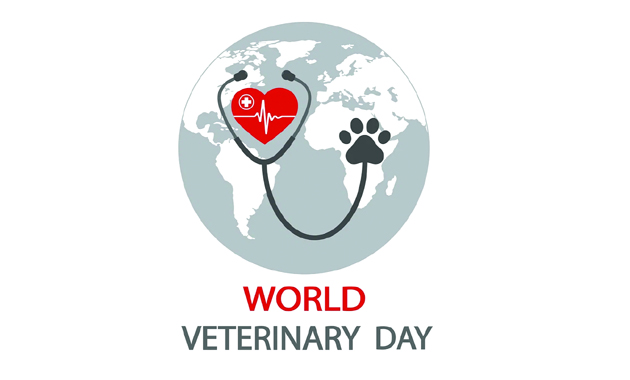Dr Divya Sharma
“The greatness of a nation and its moral progress can be judged by the way its animals are treated.”? Mahatma Gandhi
“The World Veterinary Day” is enshrined to honour the veterinary profession every year on the final Saturday of April. Theme for 2024 -“Veterinarians are essential health workers”
World Veterinary Day aims to increase public awareness about the commendable role of veterinarians and their commitment towards animal health, welfare, and public health. It recognizes the lifesaving work performed by veterinary professionals, celebrating their unwavering dedication for preserving the health and welfare of humans and animals. A veterinarian’s contribution is not only limited to providing necessary medical care, preventive services, and professional advice for well being and longevity of our furry,
World Veterinary Day
feathery, and hoofed pets, but they also play a critical role in promoting animal welfare.
Veterinarians are committed to provide complete care for both animals and their human partners, whether such services are in the form of disease diagnosis, treatment, surgical procedures, or advise on preventive care. On World Veterinary Day, we have the chance to honour and commemorate the contributions made by veterinarians and to raise awareness of their efforts to enhance both human and animal health. It is important to understand that being a veterinarian involves much more than just taking care of animals. In the scientific dimensions of defending and advancing public health, food safety, antibiotic resistance, human and animal welfare, contributions of veterinarians are indispensable.
ROLES AND RESPONSIBILITIES OF
VETERINARIANS AS HEALTH WORKERS
Veterinarians generally contribute to public health on variety of herd health programmes, which include disease diagnosis, treatment and prevention. Schemes regarding husbandry, handling, reproductive efficiency, vaccination regimens, nutrition, stress reduction, environmental advice on biosecurity and bio containment plans. The appropriate and prudent use of antibiotics, disease surveillance, outbreak investigation and mitigation, vaccination against particular high-consequence or high-prevalence pathogens (e.g., Salmonella and E. coli O157:H7), collaboration with other health professionals (One Health), inspection of food facilities (e.g. production, retail, and storage), import-export examinations, leadership of the health department, public health (risk) communication, food supply following disasters, and research into safer food production processes are additional crucial activities in addition to monitoring the health of the livestock and community animals.
Challenges& Future Ahead
In summary, zoonosis is and will continue to be a worldwide health concern. Globalization demands for greater understanding and more effective methods as well as solutions in current dynamics of public health security. It is expected of veterinarians to utilize scientific knowledge, analyze problems, and assess risks by providing strategic and practical solutions. To combat the challenges in planning and carrying out mitigation and surveillance programmes, the need for improved integration of public health systems, food safety and environmental protection is of pivotal importance. As veterinarians for such risk-based regulatory management, it is our responsibility to devise, formulate and provide competent sustainable scientific policies and practices related to agriculture, animal welfare, public health, environment, climate change, wildlife and biodiversity that shall open the gateways of social and economic development.
(The author is Municipal Veterinary Officer (MVO) JMC


